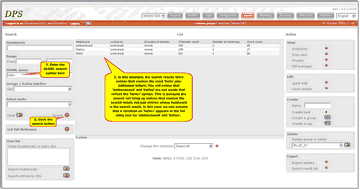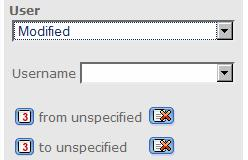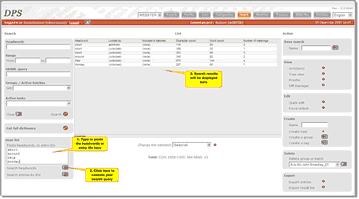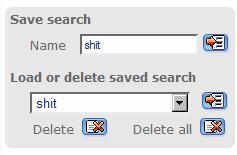| Show/Hide Hidden Text |
The DPS website offers a variety of ways to search for entries. These search options are all accessed by clicking the Search ![]() button in the DPS toolbar:
button in the DPS toolbar:
When you have clicked the search button you will see a screen that looks like this:
The search options appear in the left-hand column:
To search for entries by Headword, enter the Headword you wish to search for in the 'Headword' field, then click the Search ![]() button:
button:
Searches are not case sensitive. Use the wildcard character (an asterisk '*') to execute a search for part of a word, for example:
| • | ab* will find all Headwords beginning with 'ab', such as about, abroad and abstract. |
| • | *ab will find all Headwords ending with 'ab', such as flab, drab and kebab. |
| • | ab*t will find all Headwords beginning with 'ab' and ending with 't', such as about, abreast and abort. |
| • | ab*d*n* will find all Headwords starting with 'ab' followed by a 'd' and an 'n' (in that order) somewhere within the headword, such as abdication, abdominal and abduction. |
The Metadata search is extremely useful as it allows you to search for groups of entries based on Metadata criteria, i.e. information that is attached to an entry, but no actually part of the entry. Examples of Metadata searches include:
| • | Searching for all entries with Tags. |
| • | Searching for entries with Annotations. |
| • | Searching for entries that are Locked. |
The Metadata search is carried out in the same entry field as the headword search, but it requires a special syntax: label:<desired value of label>
Type your search syntax into the 'Headword' field then press the Search ![]() button:
button:
Use this list to execute the various types of Metadata search available:
| • | Groups:<group name> (see Groups). For example, typing the search syntax group:SweepUp would return all members of the group called 'SweepUp'. |
| • | Tags:<tag name> (see Tags). For example, typing the search syntax tag:1stEdition would return the appropriate entry versions tagged as '1stEdition'. |
| • | Annotations (see Annotations). You can search by: |
| – | Status: annstatus:<status label>. For example, typing the search syntax annstatus:ForAction would return all entries with annotations having status 'ForAction'. |
| – | Topic: anntopic:<topic value>. For example, typing the search syntax anntopic:IPA would return all entries with annotations having the topic 'IPA'. |
| – | Topic full text: anntopicft:<topic value>. For example, typing the search syntax anntopicft:IPA would return all entries with annotations including 'IPA' in the topic. |
| – | Text: anntext:<text value>. For example, typing the search syntax anntext:rhotic would return all entries with annotations having text containing 'rhotic'. |
| • | Status (see Status) status:<option>. There are four options: |
| – | typing the search syntax status:locked will return all entries that are locked. |
| – | typing the search syntax status:unlocked will return all entries that are unlocked. |
| – | typing the search syntax status:outstore will return all entries that are have an outstore version. |
| – | typing the search syntax status:discarded will return all entries that are discarded. Note that a discarded entry is one that has been deleted from the dictionary. However, its data is not removed from the database and can therefore be restored by your DPS manager if necessary. |
| • | Validity (See Validity) valid:<option>. There are two options: |
| – | typing the search syntax valid:y will return all entries that are valid. That is, entries whose structure conforms to the structure specified for your project. |
| – | typing the search syntax valid:n will return all entries that are not valid. That is, entries whose structure does not conform to the structure specified for your project. |
![]() Note: the Metadata search can be combined with the Headword search. For example, the following search syntax will find all open annotations in letter A: a* annstatus:open
Note: the Metadata search can be combined with the Headword search. For example, the following search syntax will find all open annotations in letter A: a* annstatus:open
The Range search allows you to search for entries between a particular alphabetical range (eg. A-F or X-Z). There are two ways you can execute a Range search:
| 1. | Enter the Entry Label in the 'From' and 'To' text boxes:
The DPS will find both the entries you specify plus all entries that fall alphabetically between them. Drop-down lists of available Headwords, based on what you type in the range boxes, will appear as you fill in the boxes; you can select a headword from them by clicking on it and the DPS will fill in the text box with the appropriate entry label. |
SkXML is a query language that allows you to carry out more complicated searches combining structure and content. To use the SkXML search, enter the syntax into the SkXML Query field:
 |
| Click to enlarge |
The full syntax is not given here but these are a few commonly used SkXML searches:
Word search |
|
cast |
The word “cast”, case and accent insensitive: "Cast" and "cást" will also match |
&cast |
The word “cast”, accent sensitive: "cást" will no longer match |
#cast |
The word “cast”, case sensitive: "Cast" will no longer match |
&#cast |
The word “cast”, accent and case sensitive: "Cast" and "cást" will no longer match |
Regular expressions |
|
[ae] |
a or e |
[a-d] |
Any letter between a and d |
. |
Any letter |
hel. |
“held” or “hell” or “helm” |
? |
The previous item zero or one time |
hello? |
“hell” or “hello” |
* |
The previous item zero or more times |
hello* |
“hell” or “hello” or “helloo” or “hellooo” |
hell.* |
“hello” or “hellos” |
hel(lo)* |
“hel” or “hello” or “hellolo” |
+ |
The previous item one or more times |
hello+ |
“hello” or “helloo” |
.* |
Any word |
Matching XML elements |
|
<q |
Match the <q XML element including its opening tag, its content and closing tag |
<q:coin |
Any <q XML element with the word “coin” in the content (at any level) |
<q=coin |
Any <q XML element whose content is exactly “coin” |
<!q:coin |
The word “coin” but not in a <q XML element |
For a further explanation of SkXML and a more extensive list of syntax see SkXML and Corpora under the System Features for Advanced Users section.
The Groups/Active Batches Search uses a drop-down list in the search panel:
The drop-down list allows you to find the entries contained in any group or batch (see Creating and Using Groups for an explanation of the difference between groups and batches). Select the appropriate batch or group name from the list and click 'Select'. Batches are arranged in a sub-list under their task; groups are displayed under the heading 'group'.
![]() Note: only active batches (ie. those whose entries have not yet completed all their steps) are displayed in this list.
Note: only active batches (ie. those whose entries have not yet completed all their steps) are displayed in this list.
When you select a batch name, another drop-down list will appear:
The second drop-down list allows you to apply a filter the entries in three simple ways:
| 1) | as is (default): does not apply a filter but simply retrieves the entries in the selected batch 'as is' |
| 2) | and add: retrieves entries in another batch as well (to be selected from a third drop-down list) |
| 3) | and subtract: retrieves those entries in the selected batch but removes those from another group or batch(to be selected from a third drop-down list) |
The Active Tasks Search uses a drop-down list that looks like this:
This drop-down list allows you to find the entries allocated to a Task. Select the appropriate task name from the list and click 'Select'.
![]() Note: only active tasks (ie. those whose component batches have not yet completed all their steps) are displayed in this list.
Note: only active tasks (ie. those whose component batches have not yet completed all their steps) are displayed in this list.
| 1) | Select the type of action you are interested in from the dropdown: created/modified/last modified. |

| 2) | That enables the username dropdown and the date selectors. |

The types of search described above can be combined: simply fill in more than one of them and click 'Search'. Only those entries that fulfill all the specified requirements will be returned.
In this example we will specify the batch 'g2gd_01' in the 'Groups/Active Batches' drop-down list and gag to gail in the range search boxes:
The Full Dictionary Search gives you a complete list of the dictionary contents. Simply click on the search icon alongside 'Get full dictionary':
These searches allow you search on an arbitrary list of either Headwords or entry IDs. This is useful when the list is compiled outside the DPS, for example, days of the week, colours, entries that should have a picture allocated and so on. Type or paste the desired Headwords/IDs into the text box (one per line) and click either the 'Search Headwords' or 'Search entries by IDs' button, as appropriate:
 |
| Click to enlarge |
Searches (and note this is not the search result, which can also be saved as a group) can be saved and recalled later. When recalled the exact same search can be carried out again or it can be used as a template and modified.
To save a search, scroll to bottom of left-hand column, give the search an appropriate name and click the button left of the name field.
To retrieve a search, select it from the save searches drop-down box and press the button to the left.
To delete a search, select the search and press delete button.
To delete all, press that button.
